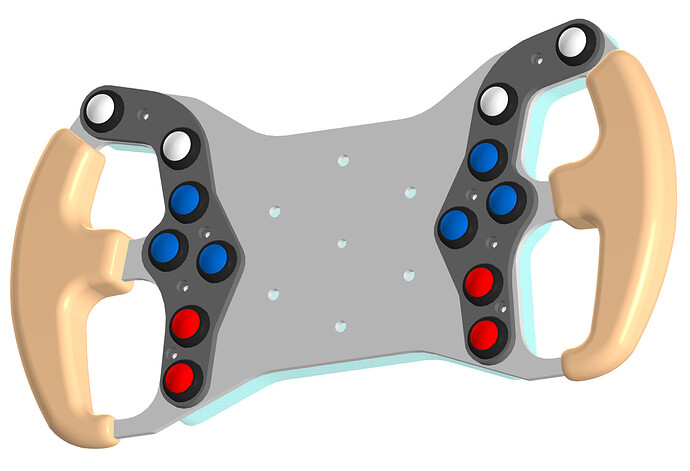Hello comrades. I had not yet finished with the design of my steering wheel, as there was a wild desire to build a mobile platform. Today I tried a sketch from the example of step direction, for signaling I use the second arduino board. The pulses are applied every 100 microseconds, but the motor does not rotate. Please tell me, what am I doing wrong? By the way, my wife is very glad that I found you guys)))
/**
* A position control example using step/dir interface to update the motor position
*/
#include <SimpleFOC.h>
// BLDC motor & driver instance
BLDCMotor motor = BLDCMotor(7);
BLDCDriver3PWM driver = BLDCDriver3PWM(9, 10, 11, 8);
// Stepper motor & driver instance
//StepperMotor motor = StepperMotor(50);
//StepperDriver4PWM driver = StepperDriver4PWM(9, 5, 10, 6, 8);
// encoder instance
Encoder encoder = Encoder(2, 3, 1024);
// channel A and B callbacks
void doA() { encoder.handleA(); }
void doB() { encoder.handleB(); }
// StepDirListener( step_pin, dir_pin, counter_to_value)
StepDirListener step_dir = StepDirListener(A4, A5, 2.0f*_PI/200.0);
void onStep() { step_dir.handle(); }
void setup() {
// initialize encoder sensor hardware
encoder.init();
encoder.enableInterrupts(doA, doB);
// link the motor to the sensor
motor.linkSensor(&encoder);
// driver config
// power supply voltage [V]
driver.voltage_power_supply = 12;
driver.init();
// link the motor and the driver
motor.linkDriver(&driver);
// aligning voltage [V]
motor.voltage_sensor_align = 3;
// index search velocity [rad/s]
motor.velocity_index_search = 3;
// set motion control loop to be used
motor.controller = MotionControlType::angle;
// contoller configuration
// default parameters in defaults.h
// velocity PI controller parameters
motor.PID_velocity.P = 0.2f;
motor.PID_velocity.I = 5;
motor.PID_velocity.D = 0;
// default voltage_power_supply
motor.voltage_limit = 5;
// jerk control using voltage voltage ramp
// default value is 300 volts per sec ~ 0.3V per millisecond
motor.PID_velocity.output_ramp = 1000;
// velocity low pass filtering time constant
motor.LPF_velocity.Tf = 0.01f;
// angle P controller
motor.P_angle.P = 10;
// maximal velocity of the position control
motor.velocity_limit = 100;
// use monitoring with serial
Serial.begin(115200);
// comment out if not needed
motor.useMonitoring(Serial);
// initialize motor
motor.init();
// align encoder and start FOC
motor.initFOC();
// init step and dir pins
step_dir.init();
// enable interrupts
step_dir.enableInterrupt(onStep);
// attach the variable to be updated on each step (optional)
// the same can be done asynchronously by caling motor.move(step_dir.getValue());
step_dir.attach(&motor.target);
Serial.println(F("Motor ready."));
Serial.println(F("Listening to step/dir commands!"));
_delay(1000);
}
void loop() {
// main FOC algorithm function
motor.loopFOC();
// Motion control function
motor.move(step_dir.getValue());
}